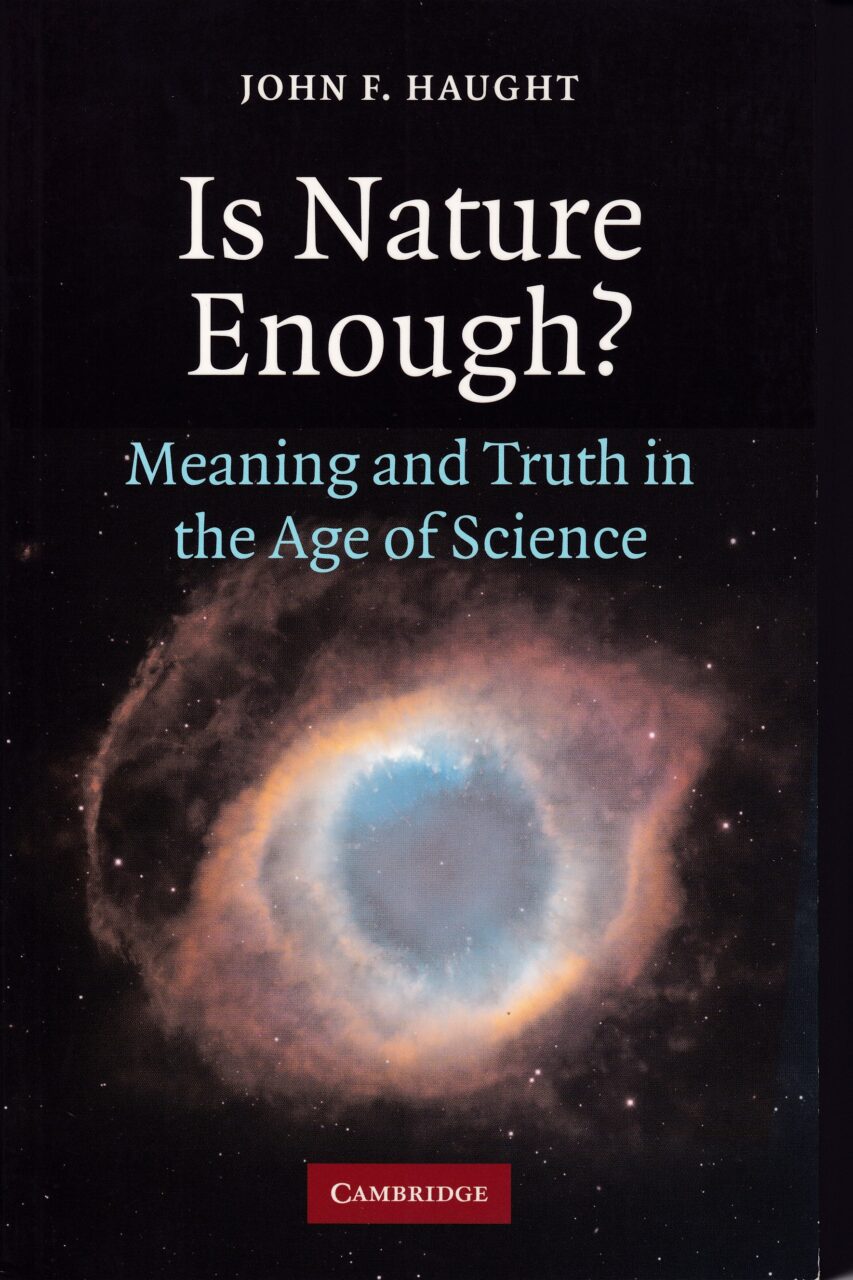Book Review by Andrew Wood
Is Nature Enough? Meaning and Truth in the Age of Science
By John F. Haught
Cambridge: Cambridge University Press, 2006; 215 pages
ISBN 9780521609937, 1st edition, paperback
AUD$46
This is a seminal work by a distinguished research professor of theology from Georgetown University, Washington DC. It was published in 2006 and he has written several books since this one (the latest named God after Einstein from 2022), but it remains an important contribution to the whole debate of whether the natural world represents all there is (“naturalism”). As might be expected, the author’s answer to the question in the title is “No!” with the reasons for that answer carefully set out in 12 chapters, dealing with topics such as Life, Emergence, Purpose, Morality, Suffering, and Death.
The central argument is that “critical intelligence” is a key concept missing from naturalistic arguments. With successive emergences (life from non-life, intelligence from non-intelligence, mind from non-mind, and so on) “critical intelligence” (including the strong “desire to know” exhibited by humans), is something naturalists tend to dismiss, despite, quite paradoxically, sometimes appealing directly to these concepts. In particular, there appears to be no good reason, based on naturalistic axioms, for Darwinists to trust their own minds (since according to them, mind is a product of random variations, selection pressures and oodles of time)—and yet they do, in their writings and public debate. To quote Haught “naturalism, I am convinced, would be a cognitionally ruinous belief system if it were ever taken consistently—which it almost never is because of the innate trust in being and truth that empower even the minds that profess to follow that creed” (p. 208). In other words, the naturalist’s creed implies that mind is a random end-product rather than “critical intelligence,” or highly valued “key to it all.” Trust of mind is central to naturalism but is denied by the “naturalist creed.”
Another area where naturalists tend to be inconsistent is on questions of morality. Haught points out that moral behaviour to a Darwinist is couched in terms of survival of the gene pool rather than an individual sense of “oughtness.” However, evidently “naturalism is rooted in a profoundly ethical belief system … you cannot miss the moral idealism that pervades their work” (p. 151, referring inter alia to Dawkins). Thus, the very thing they dismiss as a chance phenomenon is the authority they appeal to in relation to their own work and the assumption that it ought to be believed and followed. In particular, according to naturalists, the supernatural ought not to be believed in.
Haught refers many times to the open future encapsulated in theological accounts of human existence—that there is a hope for the future and a looking forward to the “not yet.” This is contrasted with the rather closed view of naturalism, with death as finality and no persistence of truth. If humanity were to be wiped out then all truth would perish also, since according to naturalists, truth is a construct of mind. He asserts there is something imperishable about truth, and the basis for its truthfulness must reside somewhere other than in perishable minds alone. Regarding life beyond death, “a sufficient foundation for this trust cannot be found exclusively by looking back to the causal past but only by taking into account the mind’s innate anticipation of a fullness of being, truth, goodness, and beauty looming on the horizon ahead” (p. 209). In Haught’s view, this “anticipation” is not an invented fiction but a “general hallmark of cosmic process” (p. 210); in other words, the emergences mentioned above speak of continuing revelation and a bright future.
In the science–religion debate, faults do not lie solely on the misapprehensions of naturalists. Haught notes “it is entirely appropriate to keep telling the old stories about the origins and end of suffering, but not … as though Darwin never lived and evolution never happened” (p. 171). “Theology should never be seen as an alternative to good science” (p. 172) and, in particular, theology needs to take into consideration non-human suffering in an overall appraisal of this topic. However, apart from vague notions of gene-pool advantage from the adaptive nature of humans facing suffering, Haught argues that “Darwinian naturalism could never, even in principle, penetrate to the core of religion or theodicy” (p. 180). Suffering, in a sense, is a consequence of an unfinished initial creation. Haught argues that if this creation was perfectly finished, then the world would not be distinct from its maker, a pantheistic view Haught emphatically rejects.
The human “desire to know,” with an imperishable critical intelligence, naturally leads individuals on to fullness of being and a valuing of the mind, which appears absent in purely naturalistic accounts of what to expect in the future. A theological account of hope for the future includes belief in continuing emergence and in particular a “power of the future.” Haught explains this phrase: the openness of the future (rather than the perceived closed notions of naturalism) represents a power or “potentiation.” Further, he suggests that this “power of the future” is the best name for God, whose central action is the “arrival of the future” (p. 214).
I hope I have conveyed from these summary paragraphs and quotations the flavour and the main thrust of what is quite a challenging read, but a refreshing one. Often the answers to the question of what is missing from naturalist accounts of existence are somewhat unsatisfactory, but not so in this account. A book worth reading then re-reading. At 215 pages this is doable. The style is quite scholarly, and reading the book requires some concentration to follow the well-reasoned arguments. The intention, according to the back cover, is to “provide the basis for discussion among … intellectually curious people in general” and the style is very suited to this readership.

